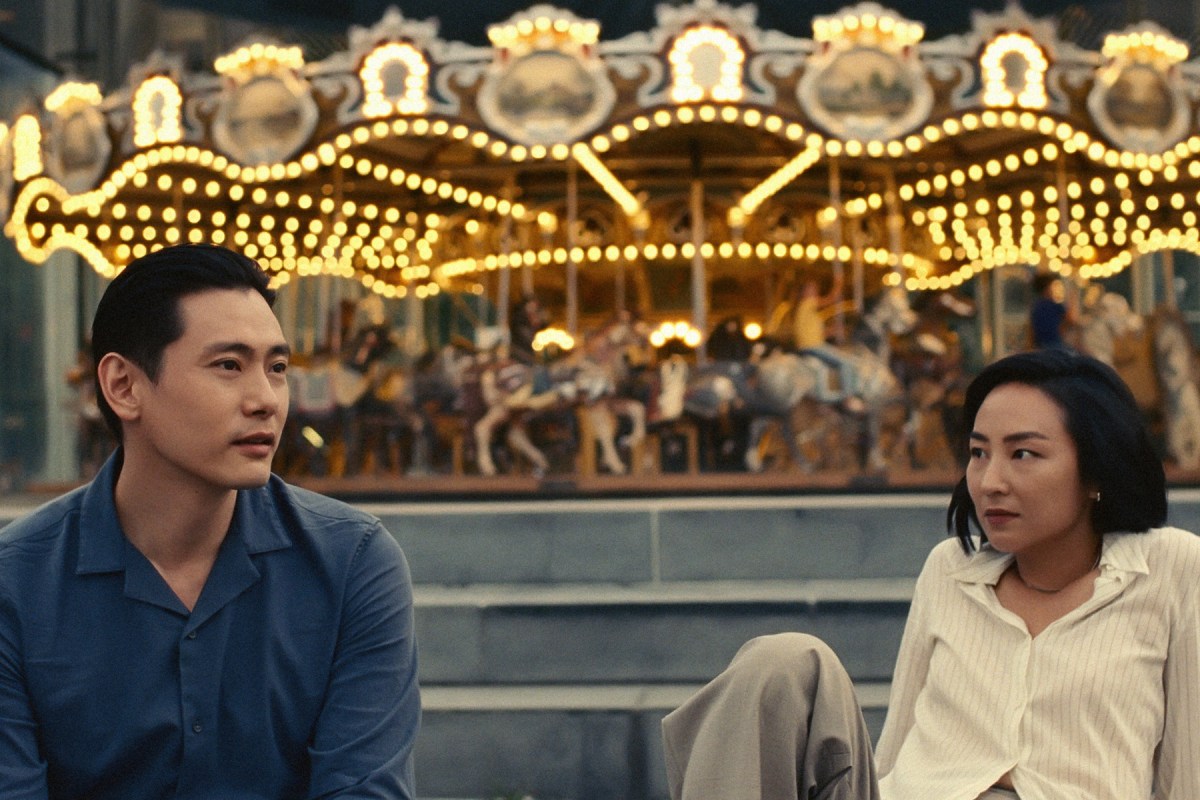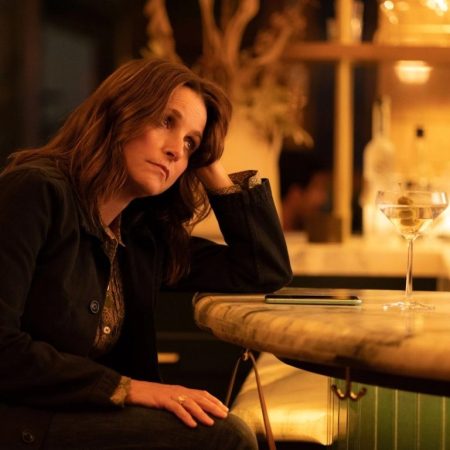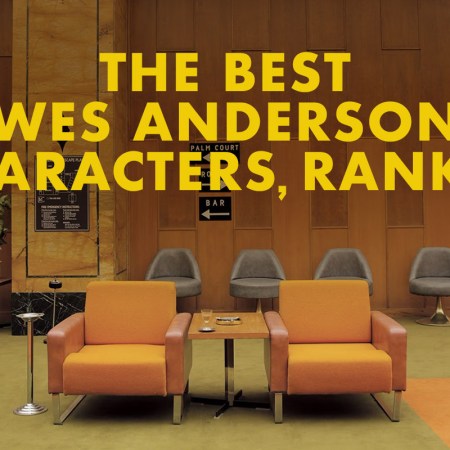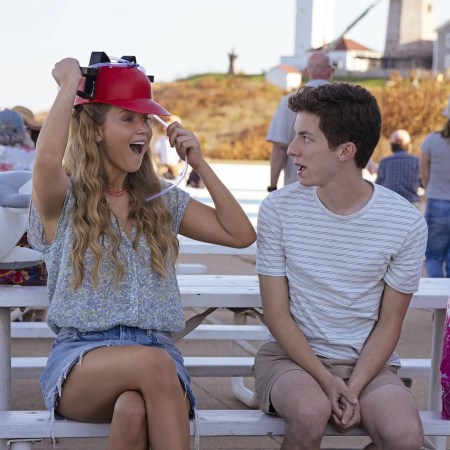It’s not difficult to understand why Past Lives is resonating with moviegoers, months after it resonated with festivalgoers at Sundance. The first feature from Korean-Canadian director Celine Song tells the story of Nora (Greta Lee) and Hae Sung (Teo Yoo), childhood sweethearts who reconnect in their mid-20s, and then again in their mid-30s. The film, which spans decades and continents, gets at simple but profound truths about the relationship between the past and present, exploring the distance that separates the people we become from who we once were. The universality of its insight is probably key to its growing word-of-mouth success, more so even than the A24 logo it has the good fortune of sporting.
This is the kind of movie, a perceptive and touching drama about the real matters of real life, that’s easy to cherish in an age of glorified toy commercials. All the same, you can be grateful for Past Lives and still acknowledge how the most acclaimed film of the year bears an unmistakable resemblance, conceptual and thematic, to another story of kindred spirits drifted apart and then back together by the ever flowing currents of time. In a way, aren’t Nora and Hae Sung retracing the steps of Jesse and Céline, the walking, talking lovers at the center of Richard Linklater’s beloved Before trilogy?
Song probably wouldn’t resent the comparison. She courts it herself, after all, with a line of dialogue in Past Lives — the moment when Nora and Hae Sung offhandedly speculate about an alternate reality where they met on a train instead of in a classroom. That’s exactly how American tourist Jesse (Ethan Hawke) meets French traveler Céline (Julie Delpy) in Before Sunrise. Released in 1995, Linklater’s sexy Gen X gabfest followed the two strangers off the tracks and into Vienna, where they spent a single day getting to know each other, before vowing to meet again, in the same place, one year later.
Linklater would blow right by that anniversary, waiting a full nine years — in the real world and the world of the characters — to reunite the lovers in Before Sunset, which takes place over a different day in Paris. He’d then check in with them again after another nine years in Before Midnight, with the two in middle age, still walking, still talking, but now navigating the long aftermath of their honeymoon phase. By the end of the trilogy, Linklater has covered 18 years across three days, and watched his characters grow from naive twentysomethings into wiser or perhaps just more jaded fortysomethings.
Past Lives covers an even greater stretch of time than the Before movies, and a perhaps more dramatic growth spurt, from adolescence to full adulthood. The film begins with its characters as children in Korea, before leaping forward by 12-year bounds — first to find them briefly reconnecting over Skype as students in their 20s, then to properly reunite them in New York City in their 30s. Like Jesse and Céline, they’re both a little hung up on “what if?”
That’s what’s ambitious, in a low-key way, about Past Lives: You could say it collapses the full scope of the Before movies into a single 106-minute feature, leaping the temporal distance that separated each in the blink of an eye. Yet in doing so, Song also clarifies what makes those films so special — and the degree to which their power can’t easily be replicated in miniature.
Much of that power hinges, after all, on the all-natural special effect of the aging process. Hawke and Delpy, reprising their roles in the sequels, grow older across the Before series, shedding hallmarks of youth as they pass from their 20s to their 30s to their 40s in tandem with their characters. While Lee and Yoo do a convincing enough job playing people nearly half their age during the middle stretch of Past Lives, they can’t achieve the same verisimilitude of life cycle Hawke and Delpy simply exude by virtue of growing older on camera.
But it’s not just that the Before stars always look the right age. They also carry the weight of passing time in their performances. To hear Jesse and Céline grapple with the way the years have reshaped their outlook is to grasp how inherently the people playing them can relate. Hawke and Delpy have changed too over the years. That the two actors cowrote the sequels with Linklater only enhances the sense that they’re channeling the process of aging, as they personally understand it and have felt it, into the ongoing story of their characters.
In conflating real and fictional time, Linklater invited the audience along on the journey: You didn’t need to be the same age as Jesse and Céline to take stock of the way your life changed between entries in the series. Following along made you the invisible third point of the love triangle, reflecting as much as the characters do on the distance separating then from now. Of course, there’s no guarantee that a viewer would keep the same schedule as Jesse and Céline, seeing Before Sunrise in ’95 and then catching each sequel upon nine-years-later release. But putting any time between the different installments reinforced their themes, turning them into four-dimensional experiences.
It’s an element that just can’t be replicated over the course of a single film, at least not one shot over a traditional production timeline. (Linklater’s Boyhood is a different story, a time-lapse magic trick.) Past Lives, leaping a dozen years in a single transitional cut, moves the hands of the clock for us. The Before movies let them tick away, in the real time Linklater put between each. Only the latter approach allows us to feel its flow and passage, to internalize how it reshapes lives like water eroding rock.
Which isn’t to say there’s nothing to latch onto in Past Lives — far from it. The modest box office success the film has enjoyed in a summer of noisy sequels is proof that audiences are responding to its gentle, quizzical reflections. And Song isn’t, in the end, just walking the path Linklater paved. The movie’s most singular choice is the presence of a third party: Nora’s husband, Arthur (John Magaro), who emotionally complicates the wistful reunion to which Past Lives inevitably builds. (For comparison’s sake, imagine a version of Before Sunset that let Jesse’s never-seen American wife tag along on his Parisian stroll down memory lane with Céline.)
“Clerks III” Highlights What Kevin Smith and Richard Linklater Have in Common
The latest “Clerks” sequel retroactively turns the whole series into Smith’s answer to Linklater’s “Before” trilogySong also works other ideas in — how, for example, Nora’s shifting sense of self is influenced by her identity as an immigrant, the her of the past culturally and geographically distinct from the her of the present. Maybe that’s the real way this sweet movie deviates from the towering trilogy it echoes. The Before movies want us to see a continuity, to recognize the Jesse and Céline of 2004 or 2013 as the same flirtatious kids we first met in 1995. Past Lives, by contrast, insists we are not our past selves. That version of us exists only in memory.
Taken together, Before Sunrise and its sequels constitute one of the great love stories in all of cinema — the fullest of romances, told through heady conversation, stretching from meet cute to rough patch, doubling always as a meditation on the way people grow and change over time. In other words: not a bad series of films to emulate! That Past Lives can’t instantly achieve what Linklater did across the sprawl of a career is no damning indictment.
Anyway, can the full, original power of the Before movies even still be located in the Before movies, which were ideally experienced in real time, with each previous installment a decade in the rearview mirror? This may be the least binge-worthy franchise in movie history; marathoning it would defeat the whole purpose of the nine years Linklater twice made us wait. You could, of course, theoretically recreate that staggered viewing schedule, taking very long breaks between each movie: Put on Before Sunrise today, and then patiently anticipate the very good night you’re going to have in 2032.
This article appeared in an InsideHook newsletter. Sign up for free to get more on travel, wellness, style, drinking, and culture.

























